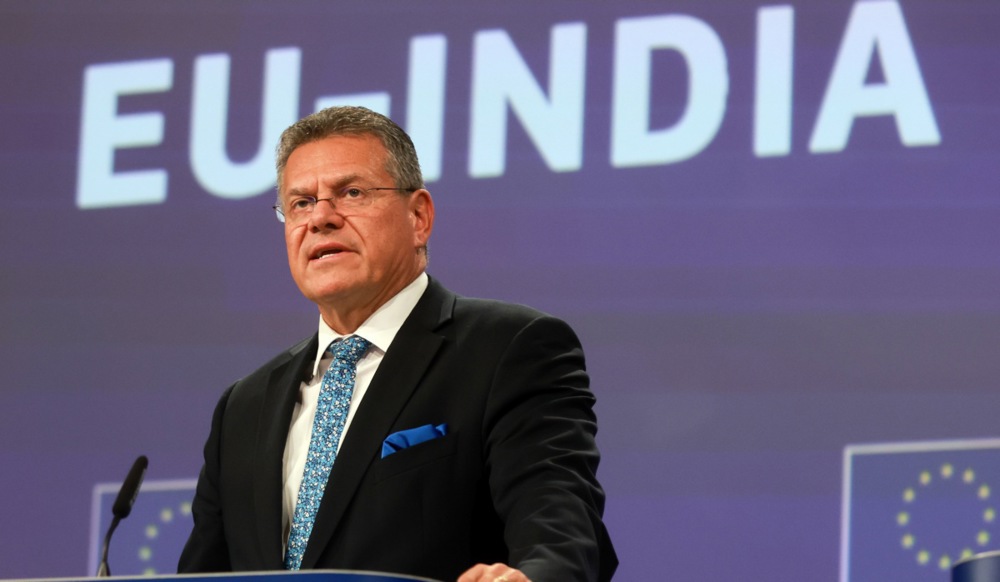EU trade chief Maroš Šefčovič said on Thursday that talks between Europe and India show little sign of a quick breakthrough, with differences over car market access still unresolved.
“I wouldn’t hide that the negotiations are extremely challenging,” Šefčovič told Euractiv in an interview. Even after agreeing to leave out some food produce from negotiations, he said, clinching what would become the bloc’s biggest trade deal by year’s end would still be a “big challenge.”
Brussels has made strengthening ties with India, the world’s most populous democracy, a centrepiece of its broader push to diversify geopolitical alliances in a world order increasingly destabilised by China, Russia, and the US.
A deal could also offer Europe’s carmakers access to a rapidly expanding market, which was one of the reasons Brussels’ rekindled trade talks with New Delhi in 2021. India recently surpassed Japan to become the world’s third largest car market after the US and China, with more than 5 million vehicles sold in 2023 alone.
New Delhi imposes tariffs of up to 110% on imported cars, and lowering them to 10% has reportedly been a key demand in its trade talks with both the EU and the US.
Šefčovič, who was in India last week for talks with Piyush Goyal, India’s commerce and industry minister, said he would have liked to make more progress on agriculture, machinery trade, and cars.
“We just agreed with the minister, let’s kind of sleep on it,” he said, describing Indian negotiators as “probably the toughest on the planet.”
Progress was impeded by differences in negotiating styles, the trade chief added, noting that New Delhi had sought to reopen issues the EU believed were already settled.
Cars remain a sticking point
Šefčovič said European negotiators are facing a “very complex” problem of securing greater access to India’s car market, which he expects to expand rapidly.
Automotive issues have long been among the toughest issues in the bloc’s trade talks with major partners. Prime Minister Narendra Modi’s “Make In India” drive to bolster domestic manufacturing has further hampered efforts to make inroads into the market for Europe’s top car brands, which are struggling to compete with upstart Chinese producers of electric vehicles.
“Europe has ambition to be a very important player on that market and I don’t think that this is questioned by our Indian partners,” Šefčovič said. “But they are following very strongly their principles … where they would like to see more local production.”
The commissioner insisted that the deal with India needed to be “commercially meaningful” to pass muster with the European Parliament and national EU governments. “Clearly we are not there yet,” he said
By comparison, he noted, talks with Indonesia – expected to be finalised next week – are likely to produce a more ambitious outcome, suggesting that Jakarta agreed to lower tariffs on cars from 50% to zero in around five years. “I think with India it will be very difficult to get to that level,” he said.
Agriculture differences persist
The trade chief also confirmed that certain farm products, including dairy and sugar, have been left out of the talks to avoid “wasting time,” given their sensitivity for both Indian and European farmers.
This means high-value food products, such as French cheese or Irish butter, could still face hefty import tariffs after the deal enters into force. “I understand [dairy] is politically very sensitive.”
Even with some of the most controversial products set aside, agriculture remains a sticking point. Negotiators failed to close the chapter in last week’s talks. “After two days,” Šefčovič said, “I hoped we would see clearer contours on agriculture.”
US President Donald Trump has pressured Europe to follow his lead in slapping tariffs on India over its purchasing of Russian oil. Asked if the EU would follow suit, Šefčovič dodged the question but said New Delhi had given him the impression they were ready to diversify their energy sources away from Russia.
“I understand from their perspective it’s not so easy to do what we did, and it was a huge effort and it was a huge cost as well for us,” he said.
India has strengthened its relations with both China and Russia in recent weeks, after the US increased tariffs on New Delhi to 50% for purchasing and refining Russian oil.
The country’s participation in a military exercise with Russian and Belarusian troops this week has further complicated relations with the West. Šefčovič called the move a “question mark” but said strong interpersonal ties between top politicians on both sides could help offset tensions.
“We knew this would be challenging,” Šefčovič said, about the prospect of a trade deal. “But it’s a huge endeavour, and therefore it’s absolutely worth trying.”
(jp, cz)
